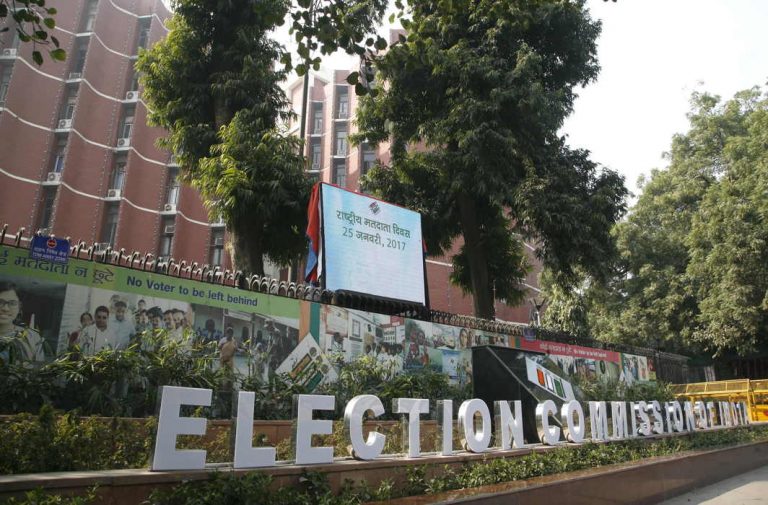
Above: The Election Commission of India/Photo: Anil Shakya
In a Special Leave Petition before the Supreme Court, the Election Commission has said that repeated laudatory reports of a candidate’s achievements must be considered as paid news
~By Deepankar Malviya
News reports in which a political leader “boasts of his achievements and appeals to the electorate to cast votes in his favour should be treated as paid news even if there is no documentary evidence to show that the money was paid,” the Election Commission (EC) has told the Supreme Court.
In a Special Leave Petition before the apex court, the EC has also stated that “if paid news can only be determined on the basis of irrefutable documentary evidence, the subterfuge would gain uncontrollable currency and would be a major setback to the effort to curb the practice of monetising the influence that candidates could wield due to their status and network in society, thus deriving an unfair advantage over others”. The poll body was challenging an order of the Delhi High Court of May 18, 2018, that ruled in favour of Narottam Mishra, the Madhya Pradesh minister for public relations, water resources and parliamentary affairs.
The matter came up when Congress leader Rajendra Bharti filed a complaint against Mishra regarding the amount disclosed by him as expenditure. In the November 2008 elections to the Madhya Pradesh Legislative Assembly, the limit for expenditure by a candidate was Rs 10 lakh. Mishra had disclosed his expenditure to be of Rs 2,40,827 only. This was done under Section 77 of the Representation of People Act, 1951, which states that “every candidate at an election shall, either by himself or through his election agent, keep a separate and correct account of all expenditure in connection with the election incurred or authorised by him or by his election agent between the date on which he was nominated and the date of declaration of result thereof, both dates inclusive”.
On April 13, 2009, Bharti filed a complaint with the Election Commission alleging that Mishra had during the elections published some news advertisements but did not disclose the amount spent on them. The EC directed the state Chief Electoral Officer (CEO) to inquire into the allegations, but the CEO reported back that all the election expenditure was accounted for and no discrepancies found. On May 28, 2012, Bharti sent another complaint to the Election Commission stating that 42 such news items were published in newspapers and the expenditure had not been disclosed by Mishra. The District Election Officer was then asked to ascertain whether different newspapers had received any payments for the publication of the news items.
In January 2013, the EC issued a show-cause notice to Mishra asking why he should not be disqualified under Section 10A of the Representation of People Act, 1951, which states that, if the Election Commission is satisfied that a person has failed to lodge an account of election expenses in time and has no good reason for the failure, it shall, through an official gazette, declare him disqualified. Mishra filed a detailed objection to the show-cause notice.
The EC then passed an order under the Act, dated June 23, 2016, disqualifying Mishra for three years. Mishra filed a Special Leave Petition in the Supreme Court on July 12, 2017. The apex court transferred the matter to the Delhi High Court on July 13, 2017, whereby the single-judge bench dismissed his petition. Mishra then moved the division bench, challenging the judgment and the order of the EC. His appeal was allowed, and the impugned order and judgment of the Election Commission were set aside by the bench of Justices S Ravindra Bhat and Sunil Gaur in its judgment dated May 18, 2018.
The EC had stated that its findings were based on two issues—whether the news published was paid news and whether Mishra or his agent authorised the expenditure for publication in newspapers. The Delhi High Court had said that the Election Commission is there only to adjudicate whether the election expenses incurred by the candidate have been accounted for or not and that any indirect control on the content of news would have a great impact on a citizen’s right to free speech and expression.
Challenging the Delhi High Court verdict, the EC has asked in its appeal before the apex court, “Where there appears in daily newspapers having a wide circulation statements issued by and in the name of a candidate which are not only laudatory of his records and achievements but also a direct appeal to the voters by the candidate himself, would it be erroneous for the EC to treat such statements as not news, but paid news?”
The EC has also mentioned in its appeal that when a candidate is held accountable for maintaining a record of the poll expenses, the burden of proving that any kind of beneficial service being rendered to him is not at his behest would also fall on him. He must prove that he has distanced himself from any such news and service.
Challenging the order, the poll panel has said, “If such motivated propaganda is allowed in the garb of free speech during the election period, candidates with a strong network of connections and undefined relationships would exploit their sphere of influence in the society and would have the unequal advantage of encashing such silent services.”

